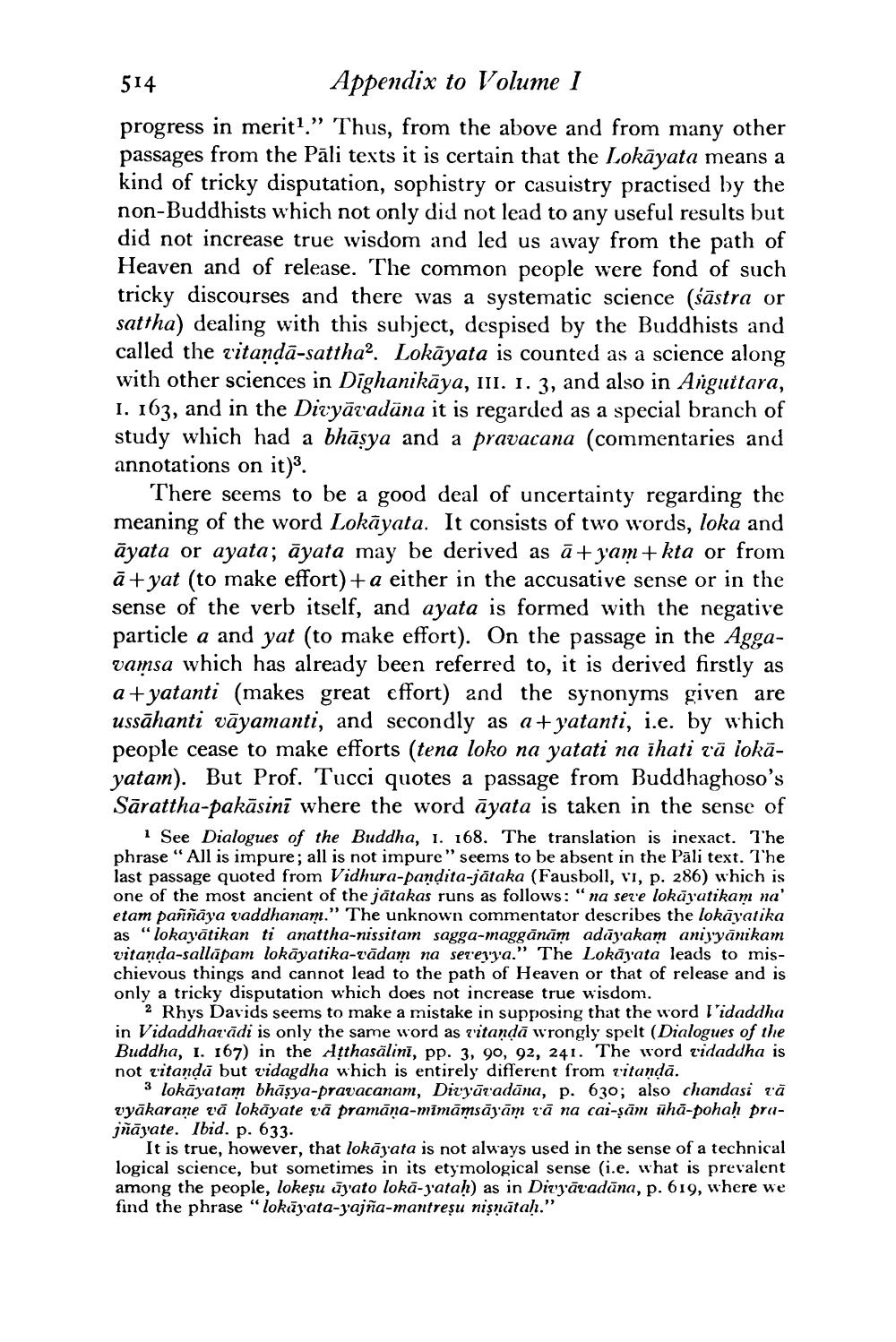________________
514
Appendix to Volume I
progress in merit1." Thus, from the above and from many other passages from the Pāli texts it is certain that the Lokāyata means a kind of tricky disputation, sophistry or casuistry practised by the non-Buddhists which not only did not lead to any useful results but did not increase true wisdom and led us away from the path of Heaven and of release. The common people were fond of such tricky discourses and there was a systematic science (śästra or sattha) dealing with this subject, despised by the Buddhists and called the vitaṇḍā-sattha2. Lokayata is counted as a science along with other sciences in Dighanikaya, III. 1. 3, and also in Anguitara, I. 163, and in the Divyāvadāna it is regarded as a special branch of study which had a bhāṣya and a pravacana (commentaries and annotations on it)3.
There seems to be a good deal of uncertainty regarding the meaning of the word Lokayata. It consists of two words, loka and ayata or ayata; ayata may be derived as a+yam + kta or from a+yat (to make effort) + a either in the accusative sense or in the sense of the verb itself, and ayata is formed with the negative particle a and yat (to make effort). On the passage in the Aggavamsa which has already been referred to, it is derived firstly as a+yatanti (makes great effort) and the synonyms given are ussāhanti vāyamanti, and secondly as a+yatanti, i.e. by which people cease to make efforts (tena loko na yatati na ihati vā lokāyatam). But Prof. Tucci quotes a passage from Buddhaghoso's Sārattha-pakāsini where the word ayata is taken in the sense of
1 See Dialogues of the Buddha, 1. 168. The translation is inexact. The phrase "All is impure; all is not impure" seems to be absent in the Pali text. The last passage quoted from Vidhura-pandita-jātaka (Fausboll, vi, p. 286) which is one of the most ancient of the jātakas runs as follows: "na seve lokayatikam na' etam paññāya vaddhanam." The unknown commentator describes the lokāyatika as "lokayatikan ti anattha-nissitam sagga-maggānām adāyakam aniyyānikam vitanda-sallapam lokāyatika-vādam na seveyya." The Lokayata leads to mischievous things and cannot lead to the path of Heaven or that of release and is only a tricky disputation which does not increase true wisdom.
2 Rhys Davids seems to make a mistake in supposing that the word l'idaddha in Vidaddharādi is only the same word as vitanda wrongly spelt (Dialogues of the Buddha, 1. 167) in the Atthasālinī, pp. 3, 90, 92, 241. The word vidaddha is not vitaṇḍā but vidagdha which is entirely different from vitaṇḍā.
3 lokāyatam bhāṣya-pravacanam, Divyāvadāna, p. 630; also chandasi vā vyākaraṇe vā lokāyate vā pramāṇa-mīmāmsāyām vā na cai-ṣām ūhā-pohaḥ prajñāyate. Ibid. p. 633.
It is true, however, that lokāyata is not always used in the sense of a technical logical science, but sometimes in its etymological sense (i.e. what is prevalent among the people, lokeṣu ayato lokā-yataḥ) as in Divyāvadāna, p. 619, where we find the phrase "lokāyata-yajña-mantreṣu niṣṇātaḥ."




